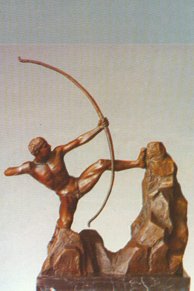Divyastra, Divya-astra, Divyāstra: 3 definitions
Introduction:
Divyastra means something in Hinduism, Sanskrit. If you want to know the exact meaning, history, etymology or English translation of this term then check out the descriptions on this page. Add your comment or reference to a book if you want to contribute to this summary article.
In Hinduism
Dhanurveda (science of warfare)
Source: Wisdom Library: DhanurvedaDivyāstra (दिव्यास्त्र) refers to a weapon (“divine weapon”). It is a Sanskrit word defined in the Dhanurveda-saṃhitā, which contains a list of no less than 117 weapons. The Dhanurveda-saṃhitā is said to have been composed by the sage Vasiṣṭha, who in turn transmitted it trough a tradition of sages, which can eventually be traced to Śiva and Brahmā.

Dhanurveda (धनुर्वेद) refers to the “knowledge of warfare” and, as an upaveda, is associated with the Ṛgveda. It contains instructions on warfare, archery and ancient Indian martial arts, dating back to the 2nd-3rd millennium BCE.
Shaktism (Shakta philosophy)
Source: Google Books: ManthanabhairavatantramDivyāstra (दिव्यास्त्र) refers to “divine weapon”, according to the Śrīmatottara-tantra, an expansion of the Kubjikāmatatantra: the earliest popular and most authoritative Tantra of the Kubjikā cult.—Accordingly, while describing the Mūrti (visualized iconic form) of the goddess Mālinī: “She is like the rising sun and is blissful with wine. Very beautiful, she has five faces and is radiant with five time three eyes. She is adorned with beautiful earrings and shines with diadem and crown. She has ten arms adorned with many ornaments. O beloved, (she holds) a bow, javelin, conch, makes the gesture of fearlessness and holds a mirror. (Such) is the divine weapon [i.e., divyāstra] in her left hands. (She holds) a thunderbolt, arrow, snake, makes a boon bestowing gesture and holds a rosary. O goddess, such is the divine weapon (held) by (her) right (hands)”.

Shakta (शाक्त, śākta) or Shaktism (śāktism) represents a tradition of Hinduism where the Goddess (Devi) is revered and worshipped. Shakta literature includes a range of scriptures, including various Agamas and Tantras, although its roots may be traced back to the Vedas.
Languages of India and abroad
Sanskrit dictionary
Source: Cologne Digital Sanskrit Dictionaries: Cappeller Sanskrit-English DictionaryDivyāstra (दिव्यास्त्र).—[neuter] a cert. magical weapon.
Sanskrit, also spelled संस्कृतम् (saṃskṛtam), is an ancient language of India commonly seen as the grandmother of the Indo-European language family (even English!). Closely allied with Prakrit and Pali, Sanskrit is more exhaustive in both grammar and terms and has the most extensive collection of literature in the world, greatly surpassing its sister-languages Greek and Latin.
See also (Relevant definitions)
Partial matches: Divya, Astra.
Query error!
Full-text: Astra, Sampradaya, Yodhin, Divyarupin, Vidvams.
Relevant text
Search found 2 books and stories containing Divyastra, Divya-astra, Divyāstra; (plurals include: Divyastras, astras, Divyāstras). You can also click to the full overview containing English textual excerpts. Below are direct links for the most relevant articles:
Formal Education System in Ancient India (by Sushmita Nath)
The Gurukula centre of learning < [Chapter 3 - Centres of Learning in Vedic and Buddhist Period]
Sundara Ramayana (translation and study) (by T. N. Jaya)
Part 1 - Bala Kanda (English translation) < [Chapter 2 - Prose Rendering of the poem Sundara Ramayana]